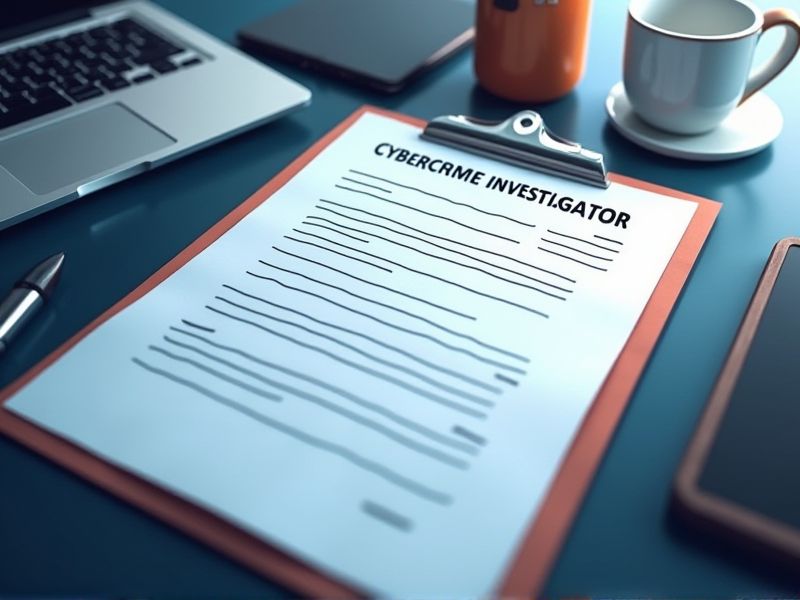
Cybercrime investigators tackle the increasingly complex world of digital crime, requiring skills beyond traditional investigative methods. Certifications provide them with specialized knowledge and tools to effectively track, analyze, and mitigate cyber threats. Employers seek certified professionals to ensure that their team possesses up-to-date expertise in evolving technologies. Essential certifications for cybercrime investigators include those in digital forensics, network security, and ethical hacking.
Certified Cyber Forensics Professional (CCFP)
The growing complexity of cybercrimes necessitates advanced skills, which are validated through the Certified Cyber Forensics Professional (CCFP) credential. Cybercrime investigators must possess comprehensive knowledge of digital forensics, legal standards, and evidence handling, areas thoroughly covered by the CCFP certification. Obtaining CCFP enhances the credibility and reliability of an investigator in both legal proceedings and industry compliance. Organizations increasingly seek certified professionals to mitigate risks associated with compromised digital security systems.
EnCase Certified Examiner (EnCE)
An EnCase Certified Examiner (EnCE) is needed for a cybercrime investigator because it ensures proficiency in using the EnCase software, critical for digital evidence examination. This certification signifies credibility and a thorough understanding of digital forensics methodologies, enhancing investigative precision. EnCE-certified investigators are better equipped to maintain the integrity of evidence, an essential factor in legal proceedings. Their expertise helps streamline complex data analysis, enabling quicker resolution of cybercrime cases.
Certified Computer Forensics Examiner (CCFE)
Becoming a Certified Computer Forensics Examiner (CCFE) equips a cybercrime investigator with essential skills needed to effectively gather and analyze digital evidence. With certified expertise, investigators can accurately reconstruct criminal activities from electronic data, enhancing the integrity of the investigation. The CCFE certification ensures adherence to legal standards, crucial for evidence admissibility in court. It enhances credibility and confidence in the investigator's findings, thus strengthening the prosecution's case.
GIAC Certified Forensic Examiner (GCFE)
Cybercrime investigators often encounter complex digital evidence, necessitating specialized knowledge to analyze and interpret data accurately. The GIAC Certified Forensic Examiner (GCFE) certification provides in-depth training in computer forensics, equipping investigators with essential skills to examine various operating systems and file structures. Holding a GCFE certification enhances credibility and demonstrates proficiency in identifying, recovering, and preserving evidence crucial for legal proceedings. As cyber threats evolve, the structured methodologies taught in the GCFE program become indispensable for effectively investigating and mitigating cybercrimes.
GIAC Certified Forensic Analyst (GCFA)
Cybercrime investigators face increasingly sophisticated digital threats, and the GIAC Certified Forensic Analyst (GCFA) credential provides them with advanced skills to tackle such complexities. Holding a GCFA certification indicates expertise in forensic techniques, allowing investigators to confidently analyze compromised systems and identify security lapses. The certification covers essential topics such as threat hunting and advanced incident response, directly aligning with tasks required in actual cybercrime investigations. Organizations value GCFA-certified professionals because their skills enhance the ability to effectively gather evidence and assist in legal proceedings.
EC-Council Computer Hacking Forensic Investigator (CHFI)
The need for EC-Council's Computer Hacking Forensic Investigator (CHFI) certification arises from its comprehensive training in digital forensics techniques, which equips investigators with essential skills to track and analyze cybercriminal activities. Cybercrimes leave complex trails requiring professionals to recover, preserve, and present digital evidence in legal settings; CHFI provides these fundamental capabilities. Without specialized training, critical digital footprints might be missed, leading to unresolved cybercrime cases or miscarriages of justice. Organizations and law enforcement agencies benefit from CHFI-certified investigators due to their ability to effectively bridge technical know-how with legal requirements in cybercrime investigations.
Certified Information Systems Security Professional (CISSP)
The CISSP certification equips cybercrime investigators with a comprehensive understanding of security practices and principles, enhancing their capability to handle complex security breaches. With the CISSP, investigators possess advanced knowledge in areas such as risk management, enabling effective identification and mitigation of cyber threats. Organizations often require their investigators to hold a CISSP to ensure a standardized level of proficiency in cybersecurity. The certification fosters credibility and trustworthiness, essential attributes for professionals tasked with safeguarding sensitive data and systems against cybercrime.
Certified Ethical Hacker (CEH)
The Certified Ethical Hacker (CEH) credential equips cybercrime investigators with the necessary skills to understand and anticipate criminal hacking techniques. When investigators possess CEH certification, they can better assess vulnerabilities in systems, leading to more effective prevention and response strategies. CEH training provides insights into the latest threats and attack vectors, enhancing the investigator's ability to stay ahead of cybercriminals. The certification also validates a professional's knowledge in ethical hacking, which is crucial in collecting and analyzing digital evidence for legal proceedings.
CompTIA Cybersecurity Analyst (CySA+)
Many cybercrime investigators require the CompTIA CySA+ certification because it ensures they have the necessary skills to detect and respond to cyber threats. This certification covers threat detection techniques, which are crucial for investigating cyber incidents. It also emphasizes vulnerability management, enabling investigators to identify weaknesses that cybercriminals might exploit. Holding CySA+ demonstrates an understanding of behavioral analytics, which can be essential in tracking and predicting malicious activities.
Certified Fraud Examiner (CFE)
Cybercrime investigators often face complex cases involving financial data manipulation, and the Certified Fraud Examiner (CFE) designation equips them with specialized skills to detect and prevent fraud. Being a CFE helps investigators understand the intricate financial systems and schemes cybercriminals use, which enhances their ability to identify illegal activities. CFE training provides crucial insights into the legal aspects and compliance issues of cybercrime investigations, facilitating more effective case handling. The CFE credential ensures that cybercrime investigators are current with emerging fraud trends and methodologies, improving their investigative accuracy and effectiveness.
Summary
When you obtain certifications as a Cybercrime Investigator, you enhance your expertise in detecting and solving cybercrimes. This often results in increased credibility and opportunities for career advancement. Employers are more likely to trust and hire certified professionals, leading to potentially higher salaries. Your ability to effectively handle cyber threats and safeguard digital environments improves significantly.
